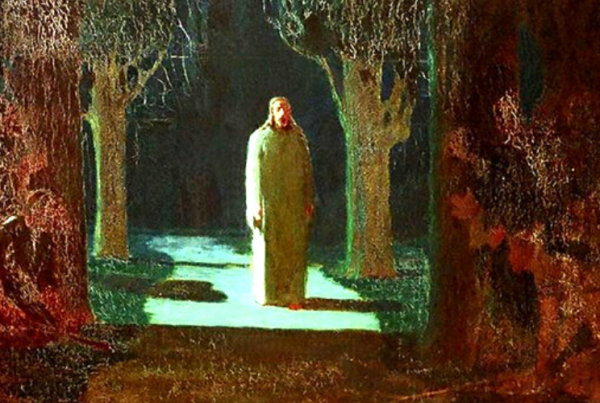
Begotten Not Made
Fr. Ed Pelrine
One of the approaches to understanding who Jesus is to look at the Nicene Creed, which we recite at mass every Sunday.
The Nicene Creed is the most widely accepted and used brief statement of the Christian Faith. It is common ground to Eastern Orthodox, Roman Catholics, Anglicans, Lutherans, Calvinists, and many other Christian groups. Many groups that do not have a tradition of using it in their services nevertheless are committed to the doctrines it teaches.
When the Nicene Creed was drawn up, the chief enemy was Arianism, which denied that Jesus was fully God. Arius was a priest in Alexandria in Egypt, in the early 300’s. He taught that the Father, in the beginning, created (or begot) the Son and that the Son, in conjunction with the Father, then proceeded to create the world. The result of this was to make the Son a created being, and hence not God in any meaningful sense.
It was also suspiciously like the theories of those Gnostics and pagans who held that God was too perfect to create something like a material world, and so introduced one or more intermediate beings between God and the world. God created A, who created B, who created C, . . . who created Z, who created the world. Alexander, Bishop of Alexandria, sent for Arius and questioned him. Arius stuck to his position and was finally excommunicated by a council of Egyptian bishops. He went to Nicomedia in Asia, where he wrote letters defending his position to various bishops. Finally, Emperor Constantine summoned a council of Bishops in Nicea (across the straits from modern Istanbul), and there in 325 the Bishops of the Church, by a decided majority, repudiated Arius and produced the first draft of what is now called the Nicene Creed.

The Arian position has been revived in our own day by the Watchtower Society (the Jehovah’s Witnesses), who explicitly hail Arius as a great witness to the truth. So here we have “begotten of the Father before all times, before all ages.” Arius was fond of saying, “The Logos is not eternal. God begat him, and before he was begotten, he did not exist.”
A chief spokesman for the full deity of Christ was St. Athanasius, deacon and later Bishop of Alexandria. The Athanasians replied that the begetting of the Logos was not an event in time, but an eternal relationship.
A favorite analogy of the Athanasians was the following: Light is continuously streaming forth from the sun. (In those days, it was generally assumed that light was instantaneous so that there was no delay at all between the time that a ray of light left the sun and the time it struck the earth.) The rays of light are derived from the sun, and not vice versa. But it is not the case that first the sun existed and afterward the Light. It is possible to imagine that the sun has always existed, and always emitted light. The Light, then, is derived from the sun, but the Light and the sun exist simultaneously throughout eternity. They are co-eternal. Just so, the Son exists because the Father exists, but there was never a time before the Father produced the Son. The analogy is further appropriate because we can know the sun only through the rays of light that it emits. To see the sunlight is to see the sun. Just so, Jesus says, “He who has seen me has seen the Father.” (John 14:9)
begetting of the Logos was not an event in time,
but an eternal relationship
God is not in time. Time, like distance, is a relation between physical events and has meaning only in the context of the physical universe. When we say that the Son is begotten of the Father, we do not refer to an event in the remote past, but to an eternal and timeless relation between the Persons of the Godhead.
What This Means For Us
Although we can have a real relationship with Jesus, we can also speak of who he is in theological terms. This Jesus, whom we worship and proclaim as God and Lord, is in eternal relationship as Son to the Father, in the Holy Spirit. He is also fully human through the Blessed Virgin Mary. This joining of divine and human natures is called the Hypostatic Union – one person with two natures. Because he is God, he has the power to save humanity. Because he is man, we humans can receive this salvation. And the reason for all of this is summed up in John 3:16: “For God so loved the world that He gave His only begotten Son, that whoever believes in him shall not perish but have eternal life.”
FOR FURTHER READING ON THIS TOPIC



